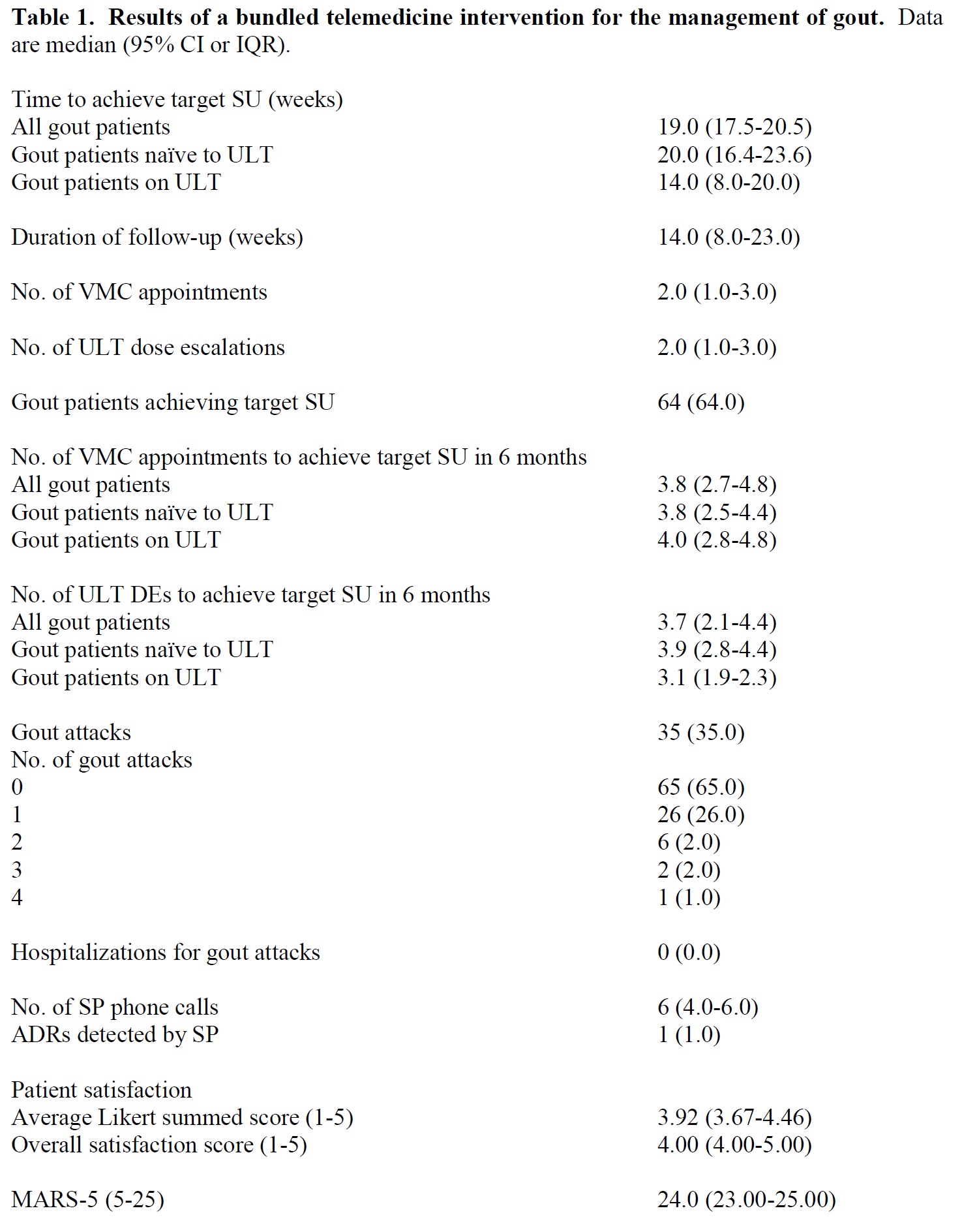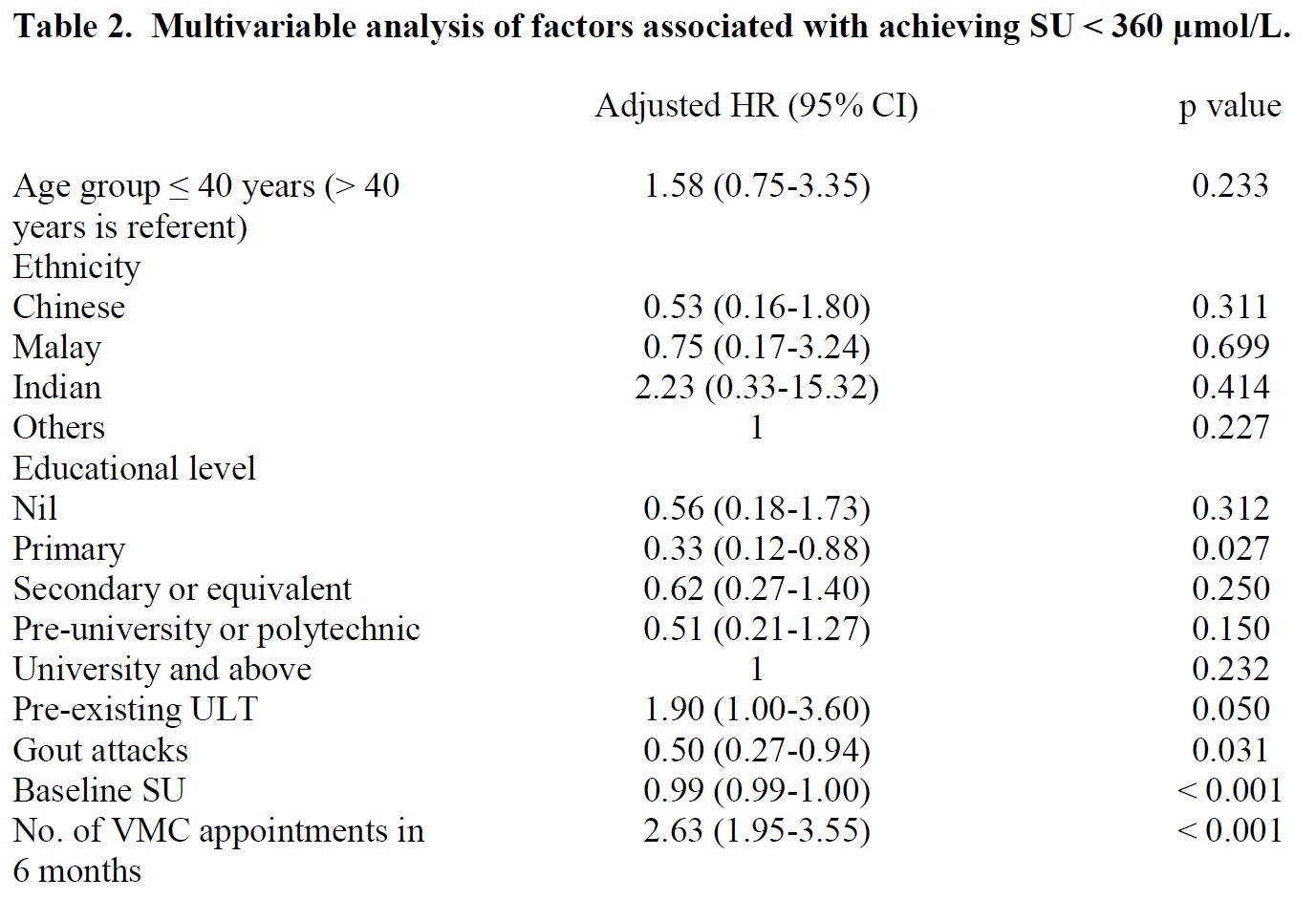Session Information
Session Type: ACR Poster Session A
Session Time: 9:00AM-11:00AM
Background/Purpose:
Urate-lowering therapy (ULT) is the mainstay of gout treatment. In our clinics, time to achieve target serum urate (SU) level during ULT titration was 37 weeks, during which 15% of patients developed gout attacks requiring hospitalization and the time from last outpatient visit to incident hospitalization was 16 weeks. The suboptimal management may be due to infrequent follow-up during ULT. We implemented and evaluated the efficacy and safety of a novel nurse-led telemedicine intervention for dose escalation (DE) of ULT for gout patients in a real-life clinical practice.
Methods:
Consecutive gout patients fulfilling indications for ULT whose SU ≥ 360 µmol/L were approached. Patients with estimated GFR < 30 mL/min, cognitive impairment and immobility were excluded. A bundle of care was designed to support telemedicine as the main intervention led by a nurse. The bundle components included: nurse education; a safety program (SP) with 6 fortnightly phone calls for adverse drug reactions (ADRs); hotline service and virtual monitoring clinic (VMC) appointments. The VMC consisted of 6-weekly laboratory investigations at government clinics or hospital, protocolized DE of ULT and courier services for ULT. Patient satisfaction and adherence were assessed using a questionnaire survey of patient experience and Medication Adherence Report Scale (MARS-5), respectively. The primary outcome was the time to achieve target SU < 360 µmol/L, variables that trended towards a significant association (p < 0.1) were examined in a multivariable Cox regression model.
Results:
We recruited 100 gout patients from July 2016 to March 2017 with a median age of 52.5 years and 90% men; 53.0% were on pre-existing ULT. The median time to target SU was 19.0 weeks (IQR 17.5-20.5), with no hospitalizations for gout attacks. One patient had an ADR, 3 SP phone calls were made to the patient and allopurinol was stopped immediately after the rash developed. The average Likert summed scores were high and similar to the overall patient satisfaction. Cox regression model revealed that high levels of education (university versus primary), absence of gout attacks, lower baseline SU and number of VMC appointments in 6 months were associated with attainment of target SU.
Conclusion:
Our study is the first to describe the utility of telemedicine in gout care. A nurse-led telemedicine intervention is effective, safe and well-accepted for the management of patients with gout. Telemedicine has the potential to improve access to care for gout patients, thereby decreasing burden of disability and overall healthcare utilization.
To cite this abstract in AMA style:
Tay SH, Low BPL, Tan PSH, Khong ZW, Chong SH, Santosa A, Lim AYN, Teng GG. Implementation and Evaluation of a Novel Nurse-Led Telemedicine Intervention for Dose Escalation of Urate-Lowering Therapy in Gout: A Clinical Practice Improvement Project [abstract]. Arthritis Rheumatol. 2017; 69 (suppl 10). https://acrabstracts.org/abstract/implementation-and-evaluation-of-a-novel-nurse-led-telemedicine-intervention-for-dose-escalation-of-urate-lowering-therapy-in-gout-a-clinical-practice-improvement-project/. Accessed .« Back to 2017 ACR/ARHP Annual Meeting
ACR Meeting Abstracts - https://acrabstracts.org/abstract/implementation-and-evaluation-of-a-novel-nurse-led-telemedicine-intervention-for-dose-escalation-of-urate-lowering-therapy-in-gout-a-clinical-practice-improvement-project/


